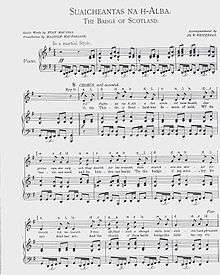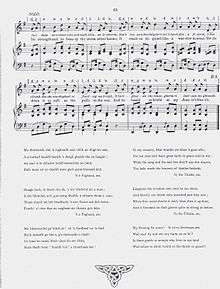The Thistle o' Scotland
"The Thistle o’ Scotland" (Scottish Gaelic: An Cluaran o h-Alba) was originally called "The Badge of Scotland" (Bràiste h-Alba) but it is more commonly known as "The Thistle o' Scotland".
| "The Thistle o' Scotland" | |
|---|---|
| Song | |
| Published | 1902 |
| Genre | Patriotic song |
| Songwriter(s) | Malcolm MacFarlane and Evan MacColl |
| Composer(s) | Frederick Wilson Whitehead |
Malcolm MacFarlane (1853-1931) translated this song from the Scottish Gaelic of Evan MacColl (1808-1898).[1] It was first published in Macfarlane's book, Songs of the Highlands, Inverness: Logan & Company, 1902, pp. 44–45.[2] The accompaniment was by Frederick Wilson Whitehead (1863-1926). It is considered by some to be a possible National Anthem for Scotland. A spirited rendition of this song by Ina Miller can be found here.
|
The Thistle o’ Scotland Chorus |
Suaicheantas na h-Alba Seisd |
|
Its strength and its beauty the storm never harms; |
Lus deas nam meur cròcach nach leònar le stoirm; |
|
O, my country, what wonder yer fame’s gane afar; |
Mo dhùthaich, cha ’n ioghnadh mòr chliù air thigh’nn uait, |
|
Langsyne[7] the invaders cam owre[8] to our shore, |
Sluagh borb, le droch rùn da, ’s tric bhrùchd air a nuas; |
|
My blessings be yours! Is there Scotsman ava |
Mo bheannachd gu bràth air! có ’n Gaidheal no ’n Gall |
 |
 |
References
- Not to be confused with the folk singer, Ewan MacColl, see http://www.poemhunter.com/evan-maccoll/biography/
- The copy of the book in the Mitchell Library, Glasgow is stamped as having been received in December 1902.
- toorie – tuft or top of plant (originally ‘small tower’).
- snod – neat, tidy, compact.
- bauld – strong, fierce (originally used of fire).
- tassle - blue tuft of the plant.
- langsyne - long since or ago.
- owre – over.